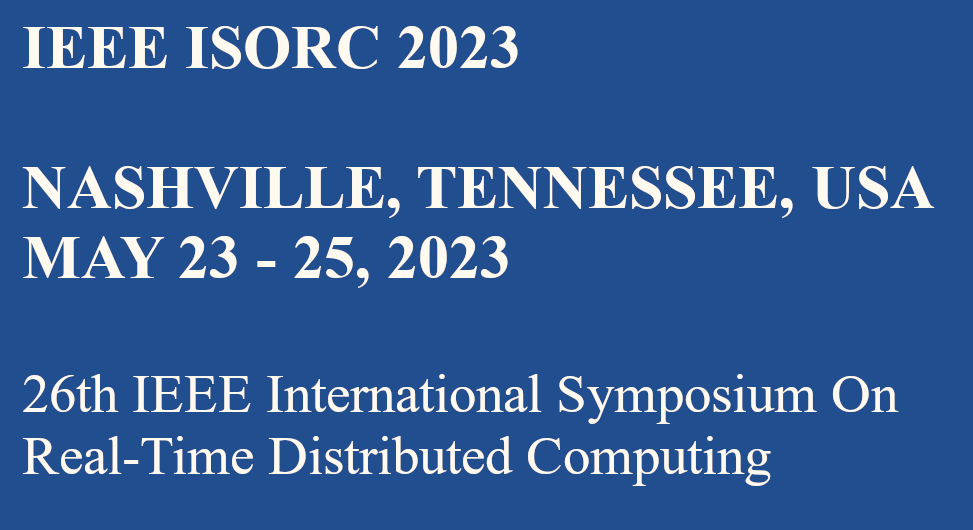











Digital twins, which are a virtual representation of real-world physical entities, have received significant interest from both the research and industrial communities. Initially, the concept of twins was introduced by the United States National Aeronautics and Space Administration (NASA) Apollo program in the 1970s, where virtual replicas of space vehicles on Earth were built to mirror the condition of the equipment during the mission. Then, the concept of Digital Twin was introduced to John Vickers by Michael Grieves in the Product Lifecycle Management (PLM) as a virtual instance (twin) of a physical system.
The main goal of this half day workshop is to address these challenges and present advanced and innovative tools, design and modeling techniques, and algorithms for diverse Real-Time Distributed IoT applications and services. Contributions addressing both theoretical and practical applications, including, but not limited to, the following topics, are welcome for submission:
- DT as a New Frontiers for Future Networks
- Emerging Cloud, Edge, Fog, and Embedded ML for Digital Twin
- Middleware Technologies for Network Digital Twins
- Network Digital Twin in IoT
- Federated learning, TinyML, and Edge AI for Real-Time Control in DTs
- Intelligent Edge, Fog and Cognitive aspects of DTs beyond 5G
- DT for Software-Defined Networks and Network Virtualization
- AI/ML-Powered DT Virtualization for IoT Beyond 5G Networks
- 5G-Powered Digital Twin for Cellular and Mobile Networks
- DT-based efficient resource allocation in 5G and 6G
- DT-aware resource allocation and task scheduling in IoT networks
- Blockchain-based trust mechanism for Digital Twin in Real-Time IoT
- Traceability supported by distributed ledgers for DT emerging Networks
- DT-enabled Cybersecurity and Privacy-Preserving for 5G and beyond
- AI-Powered Digital Twins for Anomaly Detection and Localization
- DT for Complex Systems in Big Data and Cognitive Computing
- DT Modeling and Simulation, Ontology, UML, SYSML, Model-Driven Engineering
- DT with Model Driven Systems Engineering
- Digital Twin in IoT Application Domains such as (but not limited to):
- AR/VR, 6G, XR and the Metaverse
- Smart Cities, Metaverse, Future Transportation Systems, Connected Vehicles, UAV, Connected Drones
- Smart farming and Smart Agriculture, Agri-Food Sector, Integrated Energy Systems,
- Construction Industry, industry 3D Visualization Platforms, Industrial Product's Manufacturing
- Spinning Intelligent Factory, Robotics, Electric Vehicle, Structural Integrity
- Supply Chains, Smart Production and Logistics, DT in Zero Defect Manufacturing, Predictive Maintenance
- Healthcare and precision medicine, Digital Therapeutics, etc.
- Transition towards Smart Factories and Smart Manufacturing
- Recent Developments and Future Perspectives of DT-enabled Smart Industrial Systems
- Transdisciplinary approaches to digital manufacturing for Industry 4.0
- Predictive maintenance mechanism of the DT in industrial manufacturing
Authors are invited to submit original, unpublished research papers. Papers must be written in English and strictly following IEEE style. The IEEE conference paper templates can be found here. Papers must be submitted in PDF format via the electronic submission system through the HotCRP system. All accepted paper will be indexed and published in the IEEE Explore repository.
Two types of submissions are accepted:- Regular Research papers: contributions should describe original work (up to 6 pages including all text, figures, references, and appendices).
- Short Papers and position papers: Research in progress, tools presentations, and new ideas (up to 4 pages including all text, figures, references, and appendices).
Submitted papers will be evaluated according to their rigor, significance, originality, technical quality and exposition, by at least three distinct members of an international program committee. At least one author of each accepted paper must register and participate in the workshop. Registration is subject to the terms, conditions, and procedures of the main conference .
- Extended Submission deadline: March 20, 2023
- Authors’ decision notification: April 24, 2023
- Camera-ready deadline: May 05, 2023
- Workshop date: May 25, 2023
